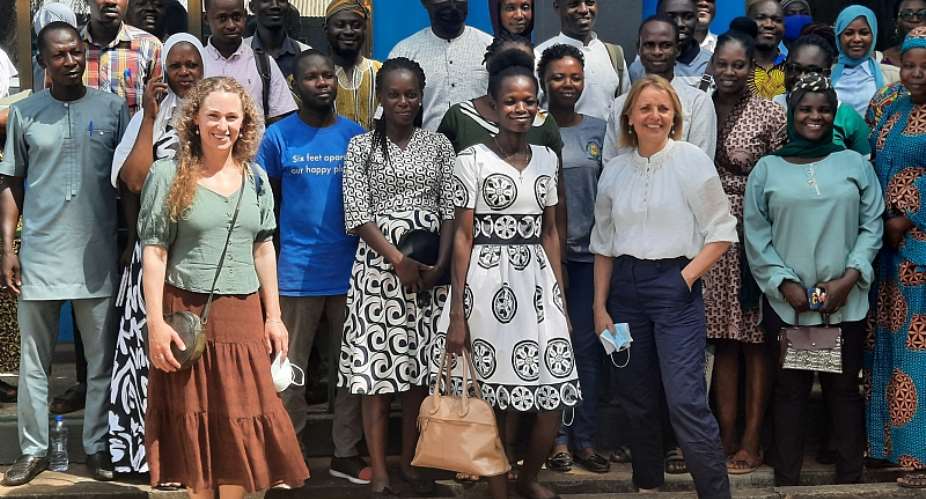Health Workers and Mental Health Volunteers in the communities have been urged to be quick in referring people with psychosocial needs and trauma to appropriate facilities to receive the needed care to rehabilitate them.
Mr Hannan Tizaa Legend, Project Officer at BasicNeeds-Ghana, who made the call, said many of the people walking naked on the streets could have been cured if they had been referred to appropriate facilities early when they began to show signs and symptoms of psychosocial needs and trauma hence the call.
He was making a presentation on recognizing trauma and referral procedures at a training workshop in Tamale for health workers and mental health volunteers.
The day’s training formed part of the Strengthening Access to Timely and Quality Rehabilitation to Survivors of Torture and Organized Violence in Ghana project being implemented by BasicNeeds-Ghana, a mental health and development advocacy organization, in partnership with Mental Health Society of Ghana, and funded by the Danish Institute against Torture (DIGNITY Institute).
The project seeks to improve access to rehabilitation through trauma-informed mental health and psychosocial support for trauma-affected people through organizational capacity development of partners and formal and informal health structures, and by increasing awareness and promote enforcement on laws and policies at the local and national levels.
Participants, who were drawn from the Tamale Metropolis, Sagnarigu Municipality and Zabzugu District in the Northern Region, were taken through what psychological trauma was, what the symptoms were, what to look out for, the referral network, the role of the various referral actors amongst others.
This was to update their knowledge to help make appropriate referrals to promote the rehabilitation of clients or people with psychosocial needs and trauma such as those exposed to trauma either at traditional healing centres where they were seeking treatment or those, who attempted migrating but failed and returned with a lot of psychological trauma.
Mr Hannan emphasised that “Timeliness is very important. This is because inaction or any delay will worsen the case of the client. So, timeliness is very important because if we do not respond appropriately, the person cannot be cured. Those, who we see on our streets walking naked; they are walking naked because the response was not timely enough. So, timeliness is very key to rehabilitation.”
He reminded various referral actors including Department of Social Welfare, CHRAJ, DOVVSU of their crucial roles in the rehabilitation of clients encouraging them to be proactive to protect and support clients, when cases were referred to them.
He encouraged health workers and mental health volunteers to continue with home visits, collect the data, attend self-help group meetings and share information on happenings within their communities with project partners.
Mr Peter Yaro, Executive Director of BasicNeeds-Ghana said people with mental health were not only those on the streets adding “we have a lot more at workplaces and homes” reiterating the commitment of the organisation to improve mental health and mental well-being of all.
Ane Viller Hansen, Public Health Advisor, DIGNITY commended health workers and mental health volunteers for the important work they were doing in the communities to help rehabilitate people with psychosocial needs and trauma.
Anne-Mette Karrer, Senior Clinical Advisor, DIGNITY commended Basic-Needs-Ghana for creating close collaboration amongst various stakeholders, who supported mentally ill people, which was important in providing support for mentally ill people in the country.
Miss Lucy Bayuo, a Mental Health Officer at Bagabaga Health Centre in the Sagnarigu Municipality, who was a participant, lauded the training saying it had further deepened her knowledge on care for people with psychosocial needs and trauma.
She said this would go a long way in helping “The people we help in the communities.”






 We’ll no longer tolerate your empty, unwarranted attacks – TUC blasts Prof Adei
We’ll no longer tolerate your empty, unwarranted attacks – TUC blasts Prof Adei
 Bawumia donates GHc200,000 to support Madina fire victims
Bawumia donates GHc200,000 to support Madina fire victims
 IMF to disburse US$360million third tranche to Ghana without creditors MoU
IMF to disburse US$360million third tranche to Ghana without creditors MoU
 Truck owner share insights into train collision incident
Truck owner share insights into train collision incident
 Paramount chief of Bassare Traditional Area passes on
Paramount chief of Bassare Traditional Area passes on
 Two teachers in court over alleged illegal possession of BECE papers
Two teachers in court over alleged illegal possession of BECE papers
 Sunyani: Victim allegedly shot by traditional warriors appeals for justice
Sunyani: Victim allegedly shot by traditional warriors appeals for justice
 Mahama vows to scrap teacher licensure exams, review Free SHS policy
Mahama vows to scrap teacher licensure exams, review Free SHS policy
 Government will replace burnt Madina shops with a new three-story, 120-store fac...
Government will replace burnt Madina shops with a new three-story, 120-store fac...
